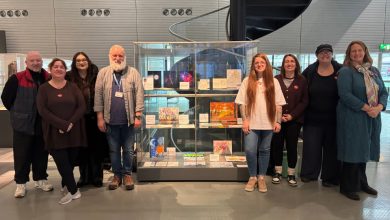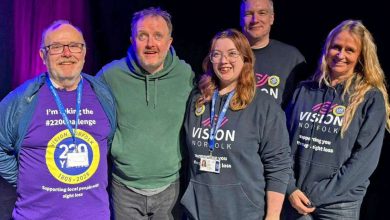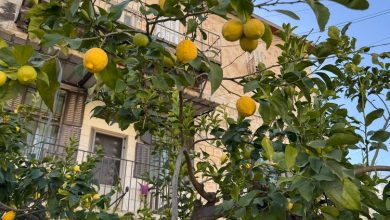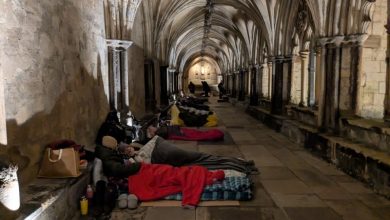Conference hears stories of modern slavery
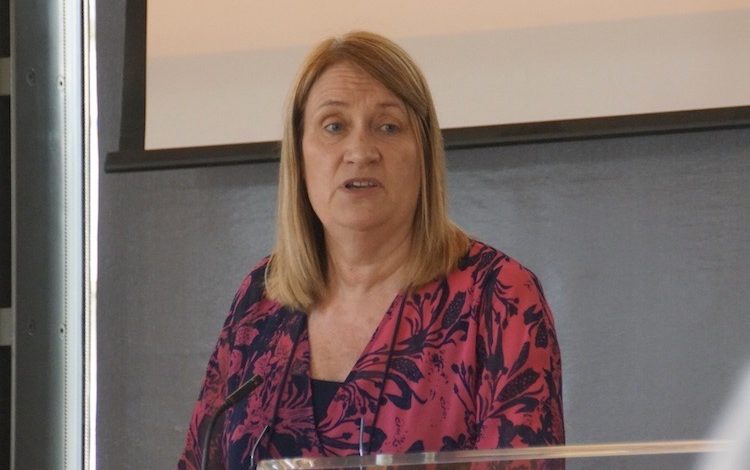
Karen Anstiss from Caritas Bakhita House in London was among speakers at a recent conference on modern slavery held in Norwich Cathedral.
The conference was organised by Norwich St Edmund Rotary Club, and Mark Little MBE, a founder member and former president of the club, was among the main speakers. Mark is a parishioner at Our Lady of the Annunciation in Poringland. Caroline Evans, a former headteacher who likewise belongs to the St Edmund Rotary Club, chaired the event.
The origins of Caritas Bakhita House lie in a visit by Karen Anstiss and three trafficked women to Pope Francis. Subsequently Cardinal Vincent Nichols asked the Metropolitan Police what he could do to respond to modern slavery. Caritas Bakhita House was born as a safe house for women who have been sexually exploited or endured modern slavery, and Karen was appointed Service Manager.
She had previously spent 31 years as a police officer, serving in the riot squad, the Flying Squad and then the Sapphire unit, which deals with rape and abuse.
Karen shared the example of a woman from Bakhita House who had fled Albania to avoid an arranged marriage with an older man, travelling to Italy with a boyfriend who then betrayed her, selling her to traffickers for £3,000. By the time she escaped she had earned some £164,000 for her owners. She is now recovering at the safe house and doing a degree in accounting.
Twelve babies – all the products of rape and abuse, have now been born at Bakhita House. The women there engage in art, yoga, gardening, baking, dog walking, art, drama and swimming. They eat together every evening, with women taking in turns to cook, using menus from their home country.
St Mary’s University in Twickenham now has a research centre into modern slavery, and it ran a six-week summer school for female victims of trafficking, including those from Bakhita House.
Mark Little MBE, who helped to initiate the Norwich conference, spoke of the current situation around modern slavery and his own fundraising efforts to support people caught up in it. He pointed out that although slavery was officially abolished in Britain in 1833, it was still far from eradicated. Thousands of people, he said, are annually trafficked into the UK from countries such as China, Vietnam and Albania.
Mark cited the example of a 15-year-old girl from Lithuania who had come expecting to take up a job in a café and who was initially sold for £4,000 then traded eight times before she managed to escape. He urged participants to be more alert to such cases. “We need people who have their eyes open, who notice when things don’t look right,” he said. Mark is currently raising funds through the rotary club for a safe house in Kolkata in India.
The conference then heard from Ann Marie Jones, an American victim of modern slavery and from Carol Metzker, who had come to support her. Carol described the effects of being deprived of freedom for 14 years: loss of identity, sense of belonging, prestige and social networks.
Ann Marie said that her descent into slavery stemmed back to being molested by her brother at the age of 13. Years after the event, she began taking drugs to deal with the emotional pain, became homeless and fell victim to a trafficker from New York. “Life was a living hell,” she said. “I could see the light at the top of the hole, but I couldn’t get up.”
She recalled the low points: washing at a fire plug, becoming barefoot when her flip flops broke, sleeping in an abandoned house with rats, and scavenging food for the first time from a trash can.
Ann Marie is now recovering at a project called Dawn’s Place. She has had her criminal record for prostitution expunged and has been able to gain custody of her two children, who were fathered by the trafficker. Her plea to the conference was: “Listen, open your eyes and don’t just walk away or turn your head.”
If you suspect that you have witnessed a case of modern slavery or trafficking, you can make a confidential call to Crimestoppers on 0800 555 111 or the modern slavery helpline Unseen on 0800 0121 700. If an urgent response is required, make a 999 call to the police, whose control staff have been trained to handle calls relating to modern slavery.
If you would like to donate to the work of Bakhita House, you can do so here.
Pictured are some of the speakers at the Norwich conference: Karen Anstiss (above) and Mark Little MBE (below).
Eldred Willey, 24/03/2022
Read the full article here




